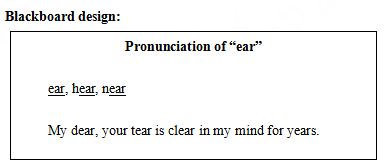To understand a word, you have to read all the letters in it; to understand a sentence you have to read all the words in it.()
第1题:
(阅读理解题)How do you acquire confidence? Speak English with friends first because with them you can speak freely without feeling shy.Then try your ability with your teachers and with foreigners if you have an opportunity to meet them.Don’t be afraid of mistakes.Nobody is above mistakes; and don’t be afraid to ask questions about things you don’t know.This is the way to acquire knowledge.Not until you begin to think in English rather than Chinese can you be said to know the language.This is not a superhuman achievement—only a question of practice.Thinking in English will help you to truly understand how the language is spoken.Read novels to build vocabulary, thus gaining confidence.Start with small volumes of 30 to 40 pages.Write down any new word you discover and look it up in your dictionary.Learn how to use the new word by making sentences with it.Bring the word to your teacher to have it explained more fully.Don’t be angry when you learn a new word today and forget it tomorrow.To forget is a natural process; to remember is unnatural and requires effort.Of 10 new words learnt in a day, only two or three will remain in the memory.The others you will forget and have to relearn.When learning them for the second time, they will come more easily, and this time you probably will remember nearly all of them.A small minority, however, may elude you again, and have to be learnt for a third time.Constant repetition is necessary.
(1).You can gain confidence by speaking English with the following people but ______?
A、 foreigners
B、 teachers
C、 family members
D、 friends
(2).When can you be said to know English?
A、 When you have confidence with English.
B、 When you have built vocabulary.
C、 When you can think in English.
D、 When you are not afraid to ask questions.
(3).We can build vocabulary in the following ways except ______.
A、 reading novels
B、 often speaking with foreigners
C、 constant repetition of new words
D、 looking up the new words in a dictionary, making sentences with them, etc.
(4).What are suggested to do if you always forget the new words?
A、 To relearn constantly.
B、 To practice more.
C、 To read novels.
D、 To be angry.
(5).What's the best title for the passage?
A、 Thinking in English
B、 Learning New Words
C、 Ways to Gain Confidence with English
D、 Communicating in English
第2题:
第3题:
此题为判断题(对,错)。
第4题:
To understand a word, you have to read all the letters in it; to understand a sentence you have to read all the words in it.()
A对
B错
第5题:
If you have any questions, please feel free to interrupt at any time. This sentence means if you have something that you don’t understand, you can make a break in at any time.
A对
B错
第6题:
第7题:


第8题:
Why do you want to leave your previous job?().
A. I'm hoping to have a better position.
B. I don't want to work at all.
C. You won't understand it.
第9题:
A:Do you have any suggestions about it? B:()
ANo, I have no idea
BLet me give you a hand
CAfter I read it in detail, will tell you my opinion
第10题:
How()you say that you really understand the whole story if you have covered only part of the article?
Acan
Bmust
Cneed
Dmay